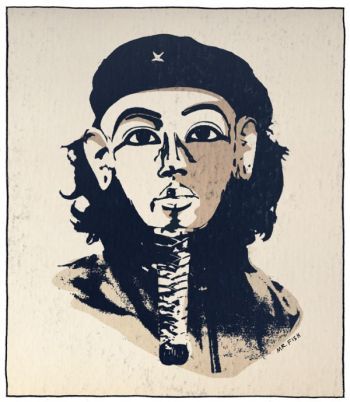
Publisher:
Bonnie King
CONTACT:
Newsroom@Salem-news.com
Advertising:
Adsales@Salem-news.com

~Truth~
~Justice~
~Peace~
TJP
Dec-18-2012 16:01

 TweetFollow @OregonNews
TweetFollow @OregonNews
Egypt's New Pharaoh And The Useful Idiots
Chris Hedges Special to Salem-News.comThe Muslim Brotherhood follows patterns similar to all revolutionary parties that replace an ancient régime...
 'Walk Like Egyptian' - Mr. Fish Courtesy: Sabbah Report |
(WASHINGTON DC Sabbah Report) - When Ayatollah Ruhollah Khomeini returned to Iran after 14 years in exile on Feb. 1, 1979, he set out to destroy the secular opposition forces, including the Communist Party of Iran, which had been instrumental in bringing down the shah. Khomeini’s declaration of an Islamic government, supported by referendum, saw him rewrite the constitution, close opposition newspapers and ban opposition groups including the National Democratic Front and the Muslim People’s Republican Party. Dissidents who had spent years inside Iran’s notoriously brutal prison system under the shah were incarcerated once again by the new regime. Some returned to their cells to be greeted by their old jailers, who had offered their services to the new regime.
This is what is under way in Egypt. It is the story of most revolutions. The moderates, who are crucial to winning the support of the masses and many outside the country, become an impediment to the consolidation of autocratic power. Liberal democrats, intellectuals, the middle class, secularists and religious minorities including Coptic Christians were always seen by President Mohamed Morsi and his Freedom and Justice Party—Egypt’s de facto political wing of the Muslim Brotherhood—as ”useful idiots.” These forces were essential to building a broad movement to topple the dictatorship of Hosni Mubarak. They permitted Western journalists to paint the opposition in their own image. But now they are a hindrance to single-party rule and are being crushed.
The first of two days of voting on a new constitution was held Saturday. According to reports Sunday, the document is being approved. The second round of voting, next Saturday, includes rural districts that provide much of the Brotherhood’s base of support, and it is expected to end in the constitution being ratified by the required 50 percent or more of Egypt’s 51 million voters. Opposition forces charge that the first round was marred by polling irregularities including bribery, intimidation, erratic polling hours and polling officials who instructed voters how to cast ballots. A large number of the 13,000 polling stations will have had no independent monitors; many judges, in protest over the drafting process, have refused to oversee the voting.
The referendum masks the real center of power, which is in the hands of the Muslim Brotherhood. The party has no intention of diluting or giving up that power. For example, when it appeared that the Supreme Constitutional Court would dissolve the panel—stacked with party members—that was drafting the new constitution, the Brotherhood locked the judges out of the court building. Three dozen members of the panel, including secularists, Coptic Christians, liberals and journalists, quit in protest. The remaining Islamists, in defiance of the judges, held an all-night session Nov. 29 and officially approved the 63-page document.
The draft constitution is filled with disturbingly vague language about democratic rights, civil liberties, the duties of women and the role of the press. It gives Islamic religious authorities control over the legislative process and many aspects of daily and personal life. One reason the constitution is expected to pass, apart from voting fraud, is because many liberals, secularists and Copts have walked away in disgust from electoral participation.
The Brotherhood, ironically, was not part of the vanguard that led the 18 days of protests in February 2011 that brought down Mubarak. It was reluctant, after decades of being severely repressed, to throw its weight behind the protesters clogging Tahrir Square. It said at first that it would not compete in the presidential election or run a full slate of parliamentary candidates. But once it saw the chaos, squabbling and disarray among its secular opponents, who ran three competing presidential candidates, it seized the opportunity.
Passages in the proposed constitution such as “The state is keen to preserve the genuine character of the Egyptian family” and the state guarantees freedom of the press except “in times of war or public mobilization” are vague enough to allow the Muslim Brotherhood to severely curtail women’s rights and ruthlessly silence press criticism. Morsi’s imperial presidential declaration of Nov. 22, until he rescinded it last week after street protests, effectively placed him above the law. Rescission of the decree will not, however, prevent the party from attaining dictatorial power.
The Brotherhood does not shrink from the use of deadly force. The violent street clashes between thousands of pro- and anti-government demonstrators outside the presidential palace last week left 10 dead and about 700 wounded. Some anti-government protesters said they were beaten in a makeshift detention and torture center that the Brotherhood set up close to the palace. Morsi showed no remorse. He announced in a nationally televised broadcast that anti-government demonstrators had confessed to being “paid thugs.” And the new government, to curb further street protests, including those that took place in Alexandria this weekend, has authorized the military to arrest civilians.
The Muslim Brotherhood, like all revolutionary parties that replace an ancient régime, has inhabited the traditional structures of power. Government ministers and cabinets have been appointed. Parliamentarians have been elected. Judges have been named. But actual power is held, as in most post-revolutionary societies, by parallel party organizations. There are two systems of authority. One is public and ceremonial. The other is secret and unassailable. It is this realization—that the formal positions of power no longer mean anything—that led to the withdrawal of 30 percent of the Constituent Assembly, including several presidential advisers. Public figures in official roles are window dressing.
Sponsored by:
Successful revolutionaries, as Crane Brinton wrote, “combine, in varying degrees, very high ideals and a complete contempt for the inhibitions and principles which serve other men as ideals. They present a strange variant of Plato’s pleasant scheme: they are not philosopher-kings but philosopher-killers. They have the realistic, the practical touch very few of the moderate leaders had, and yet they have also enough of the prophet’s fire to hold followers who expect the New Jerusalem around the corner. They are practical men unfettered by common sense, Machiavellians in the service of the Beautiful and the Good.”
Leon Trotsky explained this mentality when he described the role of the Bolsheviks, who he admitted had been a distinct minority, in 1917.
“The Bolsheviks,” he wrote, “took the people as preceding history had created them, and as they were called to achieve the Revolution. The Bolsheviks saw it as their mission to stand at the head of this people. Those against the insurrection were ‘everybody’—except the Bolsheviks. But the Bolsheviks were the people.”
In short, the revolutionary elites give liberty only to those who they believe deserve it. And all revolutions, even purportedly secular ones such as the Bolshevik Revolution, are in essence religious experiences. They hold out glorious utopian visions and insist they have harnessed the forces of history, racial purity, destiny or God. They bifurcate the world into good and evil. They are exempt, as revolutionaries, from everyday morality. They embody an absolute truth. To tolerate differences is to abet evil. It is to permit those who are misguided to squander their lives. Cardinal Robert Bellarmine argued this point in 1600 when he ordered the Dominican friar and astronomer Giordano Bruno to be burned at the stake for blasphemy. The longer heretics live, he said, the more damnation they heap upon themselves.
Revolutionary governments invert morality and the rule of law. They believe, as Maximilien de Robespierre wrote, that they pit the despotism of liberty against tyranny. This is why Morsi increasingly mirrors the dictator he replaced.
“All revolutionaries, the moment they undertake the actual responsibilities, become in some sort conservatives,” wrote G.M. Trevelyan. “Robespierre guillotined the Anarchists. The first administrative act of the [English] Regicides was to silence the Levelers.”
Revolutionary governments are adept at playing on class hatreds and the self-righteousness of true believers. The middle class proved vitally important to the Egyptian revolution, as in all revolutions. But the largely secular middle class and especially the upper class are despised by the masses of poor that make up most of Egypt’s population. The only effective form of resistance to the secular Mubarak regime was to retreat into the strict tenets of orthodox Islam. The embrace of orthodox Islam became for many of the poor an identity and the sole source of hope. There is no need to enforce dress codes or the mores of orthodox Islam in impoverished Cairo slums such as Imbaba. But in the upper-class neighborhoods of Cairo such as Zamalek, where the old regime was in economic terms more generous, orthodox Islam never had the same cachet, even as upper-class women donned the hijab and orthodox Islam made inroads into the economic elite.
This revolution, like all revolutions, has called poor believers into the streets to battle the party’s opponents. The opposition is branded the enemy of the revolution and, more ominously, the enemy of Islam; the anti-government protesters, in the words of Morsi, are the stooges of foreign embassies and Israel. And the poor—theLumpenproletariat—are only too happy to lend their services as shock troops in defense of sacred beliefs and the promised future of glory and bread. They already detested those they are now being rallied against. Once released by the state from traditional forms of restraint, the mob willingly becomes vicious.
The last three weeks of street violence presage a period of blood and repression. The opposition, which at first wanted to boycott the referendum, is mounting a beleaguered effort to defeat it. The lines are drawn. Morsi and the Brotherhood have been exposed as the heirs of the old dictatorship in new garb. The struggle for an open society is being waged by the betrayed on the streets of Egyptian cities. It will be a fight to the death. Brotherhood posters put up throughout Egypt in support of the pending constitution urge people to vote yes to “Supporting Legitimacy and Shariah [Islamic law].” Those who oppose legitimacy and Islamic law, it goes without saying, are heretics.
Article By Chris Hedges | © Sabbah Report: http://sabbah.biz/mt/?p=16114
 |
 |
 |
Articles for December 17, 2012 | Articles for December 18, 2012 | Articles for December 19, 2012
Quick Links
DINING
Willamette UniversityGoudy Commons Cafe
Dine on the Queen
Willamette Queen Sternwheeler
MUST SEE SALEM
Oregon Capitol ToursCapitol History Gateway
Willamette River Ride
Willamette Queen Sternwheeler
Historic Home Tours:
Deepwood Museum
The Bush House
Gaiety Hollow Garden
AUCTIONS - APPRAISALS
Auction Masters & AppraisalsCONSTRUCTION SERVICES
Roofing and ContractingSheridan, Ore.
ONLINE SHOPPING
Special Occasion DressesAdvertise with Salem-News
Contact:AdSales@Salem-News.com

googlec507860f6901db00.html



Terms of Service | Privacy Policy

All comments and messages are approved by people and self promotional links or unacceptable comments are denied.
[Return to Top]
©2025 Salem-News.com. All opinions expressed in this article are those of the author and do not necessarily reflect those of Salem-News.com.